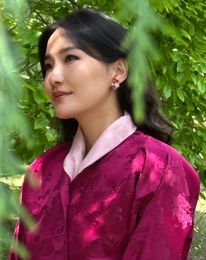Jetsun Pema, the beautiful and accomplished wife of the handsomest living king, Jigme Khesar Namgyel Wangchuck, is the youngest queen consort in the world. She has a unique tulip in the Netherlands named in her honour, called, Queen Of Bhutan. She was married to the Oxford educated, suave and well-spoken King at a dream-like private ceremony (2011) in the mountain kingdom. Over 160 foreign journalists who covered the Bhutanese royal wedding were enchanted by the elaborate rituals performed by Buddhist priests in the palace of great bliss. Today, the royals are proud parents of three children—two boys and a girl.
Bhutan’s queen has strong connections with India, going back to the time she was a student at St. Joseph’s Convent in Kalimpong, West Bengal, and later in The Lawrence School, Sanawar, in Himachal Pradesh. No wonder she is fluent in Hindi. She graduated from Regent’s University in London with a degree in international relations, psychology and art history. An ardent advocate of environmental issues and the president of the Red Cross Society in Bhutan, the queen travels with her king, and actively supports his political and social campaigns.
Let me tell you about the royal love story first. I was in Bhutan to attend the inaugural edition of Mountain Echoes—a jewel of a lit fest. The year was 2011. Delegates, high on the clean mountain air (and more), were invited to dinner at the spectacular home of Indian high commissioner Pawan Varma (author and politician). It is considered one of the best diplomatic residences in the world. Suddenly, a dramatic palace announcement threw protocol out of the window! Wangchuck had shared a very important development in his personal life at the opening of the seventh session of the parliament—he was engaged to be married! And his future wife was none other than the 20-year-old Pema, from one of the oldest, most-respected noble families of Bhutan. There was much jubilation as loyal subjects blessed their future queen, described by the besotted king as “uniquely beautiful, intelligent and graceful… unwavering in her commitment to serve the people and country….” He added, “As my queen, I have found such a person… she will make a great servant to the nation.” Wow! What a declaration. Bhutan allows polygamy (the king’s father had married four sisters in one go), but Wangchuck promised his people he would never marry another woman.
Guess what happened next? We were told the king was on his way, with his fiancée of a few hours, to join our riotous party. Ever the charming and polished host, Varma, along with his gracious family, took firm control of the evening, which was threatening to go a little wild, and the royals were warmly welcomed, strict protocol in place. It remains an evening to remember, with the king and his future queen mingling unselfconsciously with guests.
The royal honeymoon was celebrated in Rajasthan, and it may not be too indelicate in this context to speculate that the heir apparent, Dragon Prince of Bhutan (their first child), was conceived in the jungles of Ranthambore. The deep and emotional connections India has always shared with Bhutan will be continued smoothly by the next generation of royals. This was the sentiment I experienced once again while attending the 13th edition of Bhutan Echoes: Drukyul’s Arts and Literature Festival, in Thimpu, under the patronage of queen mother Ashi Dorji Wangchuck (69), an accomplished author and art patron, whose terrific book, Treasures of the Thunder Dragon: A Portrait of Bhutan, provides a comprehensive and insightful view of the Himalayan kingdom. Queen mother has big plans for the lit fest, that she shared with me over lunch. Bhutanese legacy is in great hands.
www.shobaade.blogspot.com


